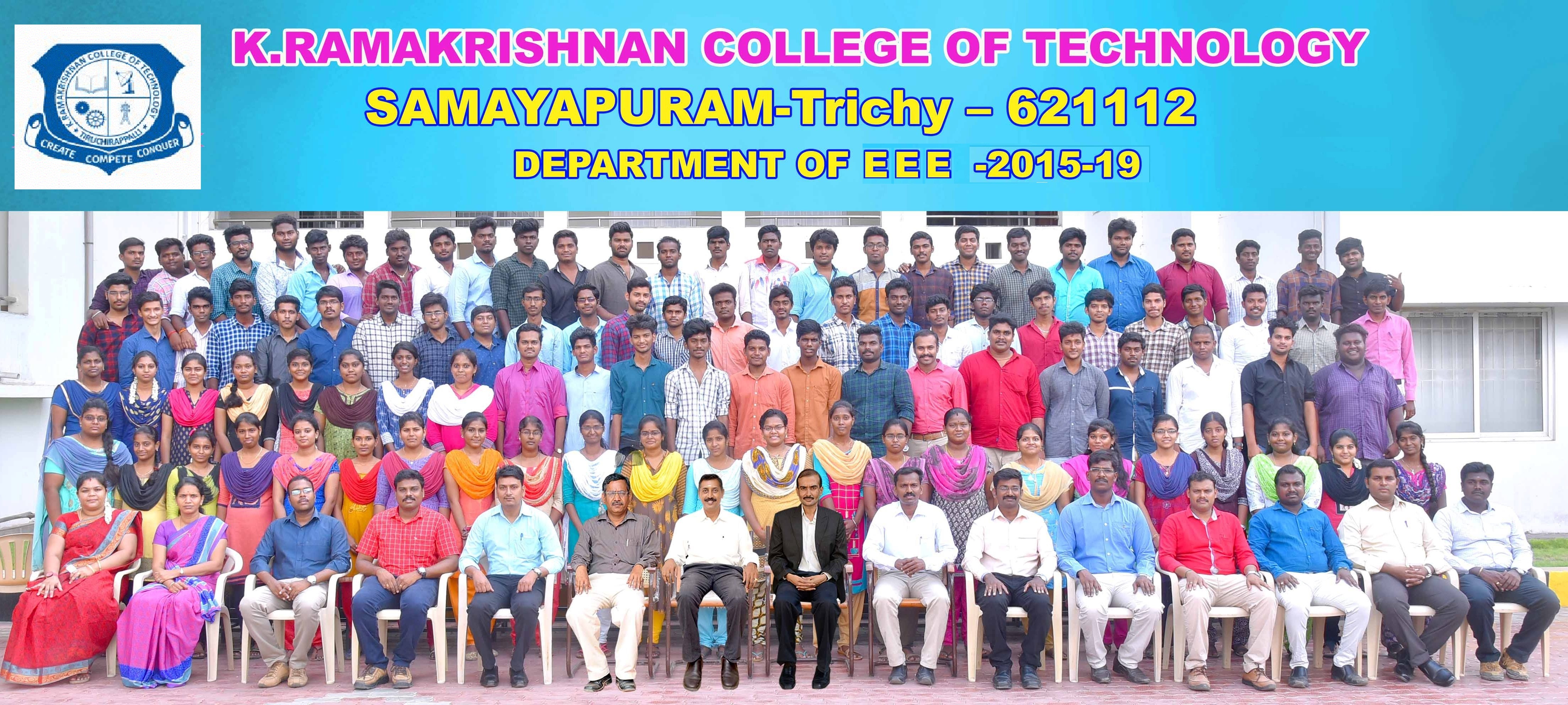DEPARTMENT OF ELECTRICAL & ELECTRONICS ENGINEERING
About Department
The Department of Electrical and Electronics Engineering was established in the year 2010 with key motif of success to the students in achieving their goal. The Department has well-equipped Laboratories and Research Laboratories with licensed software’s and also the faculties motivate and encourage their students in upgrading their skills through, motivating students to take active participation in Hackathons, Industrial Visits and In-plant training Programmes. The Department follows enhanced teaching aids like OHP, LCD , Smart Board projectors and e-Learning which help the students to visualize the concepts clearly in an easily and understandable manner.
Courses Offered
B.E. - Electrical and Electronics Engineering - 4 Years
M.E. -Power Electronics and drives - 2 Years
M.E. –Embedded Systems - 2 Years
VISION OF DEPARTMENT:
To develop globally competent Electrical Engineers with excel in education and research thereby contribute value to the society
MISSION OF DEPARTMENT:
M1: To recommend quality education in Electrical and Electronics Engineering and prepare the students for career development and higher studies.
M2: To support excellence in research activities through Research lab and promotional activities with industries.
M3: To built moral and ethical values along with the academics to serve the society
PROGRAM EDUCATIONAL OBJECTIVES:
PEO1: To keep abreast of new developments by applying knowledge on the theory and practices in the field of electrical power engineering.
PEO2: To adapt and apply relevant techniques, resources and emerging Engineering and IT tools for developing quality products in scientific and business applications.
PEO3: To apply the knowledge acquired from research and research methods including design of experiments, analysis and interpretation of data and synthesis of information for arriving significant conclusion
PROGRAM OUTCOMES:
Engineering Graduates will be able to:
PO1 Engineering knowledge: Apply the knowledge of mathematics, science, engineering fundamentals and an engineering specialization to the solution of complex engineering problems.
PO2 Problem analysis: Identify, formulate, review research literature and analyze complex engineering problems reaching substantiated conclusions using first principles of mathematics, natural sciences and engineering sciences.
PO3 Design/development of solutions: Design solutions for complex engineering problems and design system components or processes that meet the specified needs with appropriate consideration for the public health & safety and the cultural, societal and environmental considerations.
PO4 Conduct investigations of complex problems: Use research-based knowledge and research methods including design of experiments, analysis & interpretation of data and synthesis of the information to provide valid conclusions.
PO5 Modern tool usage: Create, select and apply appropriate techniques, resources and modern engineering & IT tools including prediction and modeling to complex engineering activities with an understanding of the limitations.
PO6 The engineer and society: Apply reasoning informed by the contextual knowledge to assess societal, health, safety, legal & cultural issues and the consequent responsibilities relevant to the professional engineering practice.
PO7 Environment and sustainability: Understand the impact of the professional engineering solutions in societal and environmental contexts, and demonstrate the knowledge of and need for sustainable development.
PO8 Ethics: Apply ethical principles and commit to professional ethics and responsibilities and norms of the engineering practice.
PO9 Individual and team work: Function effectively as an individual and as a member or leader in diverse teams and in multidisciplinary settings.
PO10 Communication: Communicate effectively on complex engineering activities with the engineering community and with society at large, such as, being able to comprehend and write effective reports and design documentation, make effective presentations and give and receive clear instructions.
PO11 Project management and finance: Demonstrate knowledge and understanding of the engineering and management principles and apply these to one‘s own work as a member and leader in a team to manage projects and in multidisciplinary environments.
PO12 Life-long learning: Recognize the need for and have the preparation and ability to engage in independent and life-long learning in the broadest context of technological change.
PROGRAM SPECIFIC OUTCOMES (PSOs)
PSO1 To analyze, design and develop solutions by applying foundational concepts of Electrical and Electronics Engineering.
PSO2 To apply design principles and best practices for developing quality products for scientific and business applications.
PSO3 To adapt to modern power electronics and renewable energy sources to innovate ideas and solutions to existing/novel problems.
